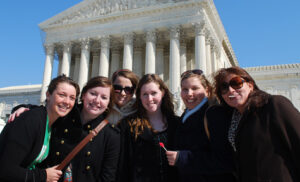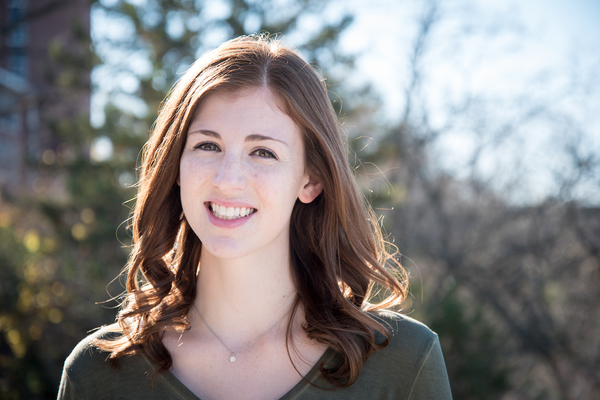Applied Learning
Internships
The department encourages students to engage in internships because they:
- Serve as one of the most effective ways to make the connections between the theoretical study of politics in the classroom and the active practice of politics in the public square
- Provide a glimpse of what’s involved in real politics and are the most effective way to make those connections
- Contribute to your education in remarkable ways (almost every student who spends a semester in Washington, D.C., for example, returns to campus having grown emotionally and intellectually in ways they never could have imagined)
- Provide a good way to explore possible careers because they provide real experience and recommendations that are often useful in the search for a first job
Internship Options and Information
 Luther is part of a consortium of Lutheran Colleges that maintains a semester-long program in Washington, D.C. The main component of the program is a four-day-per-week internship. Because there is no vacation in the middle of the semester and because students work four days each week, employers know they will have a nearly full-time worker for fourteen weeks and, therefore, almost always provide the students with genuine work opportunities. The range of internship possibilities is wide, and the program has an internship coordinator who helps students acquire internships. A limited number of internships require early applications and even security clearances, but most can be attained with relative ease the semester before attending the program.
Luther is part of a consortium of Lutheran Colleges that maintains a semester-long program in Washington, D.C. The main component of the program is a four-day-per-week internship. Because there is no vacation in the middle of the semester and because students work four days each week, employers know they will have a nearly full-time worker for fourteen weeks and, therefore, almost always provide the students with genuine work opportunities. The range of internship possibilities is wide, and the program has an internship coordinator who helps students acquire internships. A limited number of internships require early applications and even security clearances, but most can be attained with relative ease the semester before attending the program.
Students receive six credits of Internship (graded on a Credit/No Credit basis) and two credits of Directed Readings (a letter grade is assigned on the basis of the journal that students keep while doing the internship).
January Term is an ideal time to scratch the surface of a profession or activity. January Term internships almost always involve an element of “shadowing” rather than being an actual work experience. That is, you can hang around a law firm and get a sense of what lawyers do. Or you might choose to spend the month interning in the office of a state legislator.
Students can earn no more than two credits for these internships. The grading is Credit/No Credit.
Occasionally, a student will take on a project that involves working a few hours per week as an intern. Recently, for example, a student helped the Decorah chapter of the League of Women Voters organize events and work on their website.
Students usually receive 1-2 credits for these internships. The grading is Credit/No Credit.
Students may do summer internships for which they can receive credit from the department. There are two options open to students. One, the college will allow a student to do a summer internship for two credits at no cost. The credits will be applied to the fall semester total and count toward the 36 credit total covered by the comprehensive fee. The grading is Credit/No Credit.
Students wishing to pay for the internship credits may earn more credits (consult with the Registrar to determine the cost per summer credit hour). Generally, we discourage students from doing this summer internship for credit because they cost extra money and the internship experience will appear on the student’s resume and in the student’s cover letter for a first job.
On occasion, we still allow a student to spend an entire semester working in a candidate’s campaign for national office. Typically, the student will earn 12 credits for the semester. The student will earn six credits (Credit/No Credit) for the internship experience. The student also will earn two credits of Directed Readings, based on the journal we will ask the student to keep; these two credits will earn a letter grade. In addition, the student will do an independent study (almost always after the completion of the election but prior to the end of the semester). We will list this as an independent study and it will earn four credits, graded A-F.
What is PLEN?
The Public Leadership Education Network (PLEN) is a nonpartisan organization based in Washington D.C. that focuses on preparing college women for leadership roles in public policy. PLEN offers short (3-5 day) seminars on a range of policy areas.
PLEN seminar participants have the opportunity to explore careers in policy and connect with women leaders. PLEN has been offering leadership seminars in Washington D.C. since 1989 and is the only national organization whose sole focus is preparing college women for leadership in the public policy arena. Learn more about PLEN.
Why is PLEN an important part of what Luther offers?
PLEN seminars are highly valuable, and compliment both on-campus learning and the experience of students participating in the Lutheran College Washington Semester. Each PLEN program offers students the chance to explore a variety of possible careers, learn what it takes to get there, and connect with women all over the country who have similar interests and ambitions.
How would participation in PLEN seminars benefit students?
At all PLEN seminars, students gain networking opportunities, leadership skills, and public policy knowledge. PLEN’s rich and diverse network of Luther and PLEN alumna, speakers, and other volunteers provide students with life-long career resources and support.
Guidelines for internships:
- Internships are not limited to political science majors, but normally a student must have taken at least two political science classes prior to doing an internship.
- There is not a minimum grade point requirement, but there is no right as a major to do an internship. In other words, if there is concern about the student’s record and likelihood for a successful internship, the faculty members in the department can refuse an application for an internship.
- Students can apply no more than 4 hours of internship credit to the 32 hours required for a major. The only exception to the 4 hour rule is the Washington Semester internship experience. Students can apply up to 8 hours of internship credit to the major.
- Students may work with any member of the department but must have the approval of the department head.
- For all internships, students must complete the required forms prior to starting the internship. Forms are available from the Career Center. The forms require consultation with the internship advisor and the signature of the department head (when not the internship advisor).
- Students must sign up for internship credit before the add/drop date at the beginning of each term.
- Normally, one hour of internship credit will require 36 hours of internship work. Regardless of hours of internship work, J-term internships cannot earn more than 2 credits.
Keep a journal in which you write two or three times a week; if you can discipline yourself, daily writing would be good but is not required. A substantial number of the entries should recount what you have been doing at your job. Those entries should be more than a log, though, and should reflect your thoughts and ideas about what you are doing and what you are observing. You might ask whether there are activities in your office that surprise you. Are you seeing first-hand things that you had read about in texts? Are you observing a context or culture that is different from other experiences you have had? In other words, the journal should be an occasion to step back every so often and look at what you’re doing and at what is happening around you.
Although the work is the center of your internship, if you are working in Washington or a larger city, you should spend some time thinking about that larger experience in general. What do you make of urban life? How does the work day compare with your classroom studies?
We expect you to read a book of your choosing that relates to your internship. If you are working in a congressional office, for example, you might choose to read one of the accounts of Washington life penned by a congressperson. If you are working in the public defender’s office you might want to read a book that deals with the urban criminal justice system, and those persons with internships related to the media might read a commentary on media and politics. If you are doing a legal internship you might want to read something related to legal ethics or a social science study of lawyers in America or a memoir of a lawyer looking back on their life. Not only do we expect you to read the book, but we also expect to see occasional entries in your journal in which you recount and reflect upon your reading. The ideal (and we know this will not be reached all of the time) is that you will use the reading to reflect upon your internship experience. That is, we hope that you will read a chapter and then say to yourself, “Wow, that explains just why my boss did what she did yesterday!”
We want your final entry to be a short (3-5 pages) reflective essay in which you pull together your experience. This should be more than a “Wow did I have fun” kind of writing, but instead should identify a key theme or two that seems to pull the experience together. This might be a scholarly commentary or it might be a personal reflection in which you begin to assess the impact this experience has had on you. You might find it useful to re-read your journal before writing this essay and then use it to make sense of what you have been doing the past three months.
The student must arrange a follow-up session with the internship advisor after completing the internship.
Supplemental Portfolio Option: Some of you may want to add an appendix to your journal that serves as an official record of what you have done in your internship. That might include a daily diary of your activities, copies of work you have done in the office (memos, drafts, presentations to your office mates, etc.), and occasional assessments of what you have observed.
“PLEN creates a platform for incredible women in leadership positions to mentor and empower future female leaders. The seminar I attended taught me essential practical skills and allowed me to build invaluable relationships with experienced professionals. My time with PLEN complimented my Luther experience, and particularly my semester in Washington, perfectly.” —Mareda Smith ’19
